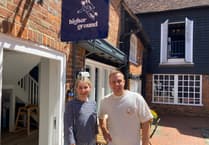"It is a fateful time, but we are full of hope - hope founded on good evidence. We know that big events are about to happen in the various theatres of war; indeed, they are even at this moment happening.
"Our planes rush over us in the depths of night and in the bright hours of daylight. Their noise may disturb some of us, but it is far better to have this really inspiring sound - for it tells of brave young men going on their crusade to smash the cruel foe who brought misery and death upon the world - than the roar and din of German bombs smashing and killing all around."
With those rousing words in its edition of May 27, 1944, the Herald gave hope that the Second World War was about to turn decisively in the Allies' favour. Though it could not have said it explicitly, no-one living in the south of England that summer could have failed to notice the huge build-up of troops and war machinery on their doorsteps.
Just a week later, on the morning of Tuesday, June 6, 1944, the Normandy landings had begun.
The May 27, 1944, Herald also reported British, American, French, Polish and "gallant" Canadian troops were already "showing the boastful Nazis who are the better men" in the air war and on the ground in Italy.
And though it recognised "much more hard fighting is still to be done south of Rome" after the break-out at Monte Cassino, the Herald repeated a "splendid and comprehensive speech” by Prime Minister Winston Churchill, declaring “it is clear that the Germans will be driven out of Italy by the Allies".
It added: "It is encouraging and we at home must make every effort to back up our fighting men; in every way we must 'Salute the Soldier'."
There was a less triumphant report in that week's paper though, telling the sad tale of perhaps the first victim of the D-Day landings.
Even the Herald at the time was not convinced by a coroner's ruling of "accidental death" after the demise of Sergeant Leonard Henry William Whale, a 36-year-old member of the Royal Army Ordnance Corps (RAOC) stationed at Aldershot.
The Coroner for West Surrey, Mr G Wills Taylor, was told Sgt Whale was hit by a train and killed close to the Lower Weybourne Lane railway bridge in the early hours of May 19, 1944.
Witnesses from Sgt Whale's unit gave evidence that he "was a good soldier and a very conscientious man". But he "always seemed to have a lot of worry on his mind" and was "very much 'browned off'" - an understated British military slang term for disgusted or depressed.
The inquiry heard Sgt Whale had been "very depressed" and struggled to sleep since joining his unit after service overseas in Africa earlier in 1944. The prospect of helping lead a new front in northern Europe could not have improved his mood.
But the inquiry also heard the deceased's last conversation with fellow soldiers concerned where he could buy a birthday card for his son - "a nice, happy, kind thought on his part," observed the coroner.
It was this piece of evidence that persuaded the coroner to give a ruling of 'accidental death' after determining there was "nothing in the evidence to show that deceased intended to do himself any harm".
Also reported in the May 27 edition of the Herald was a Spigot Mortar firing demonstration given by 'A' Company, 2nd Surrey Home Guard, to other companies of the Battalion and companies of the 24th Hants Battalion. This was said to have "duly impressed their spectators".
A dance in aid of "distressed" members of the Royal Army Service Corps was also held in the Memorial Hall, Farnham, on Thursday, May 18, 1944. A company of about 200 was present and music was provided by the Waggoners Dance Band.





Comments
This article has no comments yet. Be the first to leave a comment.